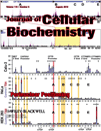
JOURNAL OF BIOLOGICAL CHEMISTRY
Scope & Guideline
Connecting Research and Innovation in Biochemistry
Introduction
Aims and Scopes
- Biochemical Mechanisms and Pathways:
The journal emphasizes the exploration of biochemical mechanisms underlying cellular processes, including metabolic pathways, signaling networks, and gene regulation. - Protein Structure and Function:
Research articles often focus on the structural biology of proteins, detailing how their structures relate to their functions, interactions, and roles in various biological processes. - Cellular and Molecular Biology:
The JBC publishes studies that investigate cellular functions, including cell signaling, cell cycle regulation, and the molecular basis of diseases. - Drug Development and Pharmacology:
The journal features research related to drug discovery, mechanisms of action of therapeutic agents, and the biochemical basis of drug interactions. - Genomics and Proteomics:
The integration of genomic and proteomic approaches to understand biological systems is a core theme, highlighting the use of high-throughput techniques to investigate gene expression and protein interactions.
Trending and Emerging
- Metabolomics and Lipidomics:
There is a growing emphasis on the study of metabolites and lipids, particularly how they influence cellular functions and disease mechanisms, reflecting an increased interest in metabolic pathways and their regulation. - CRISPR and Genome Editing Technologies:
Research involving CRISPR technology and other genome-editing methods is on the rise, as these techniques provide powerful tools for manipulating genes and understanding their roles in health and disease. - Biomolecular Condensates and Phase Separation:
The exploration of biomolecular condensates and phase separation in cellular processes is gaining traction, emphasizing the role of these phenomena in regulation and disease. - Immunology and Cancer Biology:
There is an increasing number of studies focusing on the immune response and its implications in cancer biology, reflecting a broader interest in therapeutic strategies that leverage the immune system. - Synthetic Biology and Biotechnology:
Research in synthetic biology, including the engineering of biological systems for therapeutic and industrial applications, is emerging as a significant area of interest within the journal.
Declining or Waning
- Classical Enzyme Kinetics:
Research focusing on classical enzyme kinetics has seen a decline, as newer methodologies and technologies enable more complex analyses that go beyond traditional kinetic studies. - Basic Biochemical Techniques:
There is a noticeable decrease in the publication of papers centered solely on basic biochemical techniques, as researchers increasingly incorporate advanced technologies such as CRISPR, mass spectrometry, and high-throughput screening. - Single-Cell Analysis:
Although still relevant, the volume of publications specifically addressing single-cell analysis techniques has diminished as the field moves towards integrating single-cell approaches into broader biological context studies.
Similar Journals

MOLECULAR AND CELLULAR BIOCHEMISTRY
Pioneering Insights in Biochemistry and MedicineMOLECULAR AND CELLULAR BIOCHEMISTRY, an esteemed journal published by SPRINGER, serves as a prominent platform in the fields of biochemistry and molecular biology. With a history of dissemination since 1973, this journal has made significant contributions to the understanding of biochemical processes at the molecular level. The MOLECULAR AND CELLULAR BIOCHEMISTRY journal focuses on a myriad of topics including but not limited to cellular biochemistry, clinical biochemistry, and interdisciplinary approaches in medicine, boasting a commendable categorization in the 2023 Scopus ranks where it falls under Q3 in Cell Biology, Q2 in Clinical Biochemistry, Q1 in Medicine (miscellaneous), and Q2 in Molecular Biology. Although the journal is not open access, it provides access options through institutional subscriptions, making valuable research accessible to a wider audience. With its rigorous peer-review process and high impact within the scientific community, this journal aims to advance knowledge and stimulate exploration in biochemical research, making it essential reading for researchers, professionals, and students alike.

Cold Spring Harbor Perspectives in Biology
Connecting Research with Revolutionary Biological DiscoveriesCold Spring Harbor Perspectives in Biology is a prestigious academic journal published by COLD SPRING HARBOR LAB PRESS that serves as a vital resource in the fields of Biochemistry, Genetics, and Molecular Biology. With an impressive impact factor and categorized in the Q1 quartile for its contributions, this journal is renowned for curating comprehensive reviews that synthesize the latest advancements and ongoing research in these dynamic and interconnected disciplines. Since its inception in 2009, the journal has played a pivotal role in advancing scientific knowledge through high-quality articles that cater to researchers, professionals, and students alike. Although it operates on a traditional subscription model, its contributions are indispensable for those seeking to remain at the forefront of biological research and its myriad applications. With a commendable ranking of #19 out of 221 in general biochemistry, genetics, and molecular biology on Scopus, this journal ensures that its readers have access to cutting-edge insights and a rigorous academic discourse.

Journal of Biochemistry
Pioneering research in biochemistry and beyond.Journal of Biochemistry, published by Oxford University Press, is a prestigious academic journal that has been at the forefront of biochemical research since its inception in 1922. With an ISSN of 0021-924X and an E-ISSN of 1756-2651, this journal serves as a platform for disseminating high-quality research in the fields of biochemistry, molecular biology, and medicine, holding impressive rankings such as Q2 in Biochemistry and Medicine (miscellaneous) in 2023. As of 2024, the journal continues to explore significant topics in these areas, offering valuable insights for researchers, professionals, and students alike. The journal does not currently offer open access, but it remains a vital resource for anyone in the biochemical community seeking to stay updated on the latest discoveries and advancements. With its rich history and dedication to scientific excellence, the Journal of Biochemistry is an indispensable part of the scholarly landscape.

DNA AND CELL BIOLOGY
Illuminating the Path of Cellular AdvancementsDNA AND CELL BIOLOGY, published by Mary Ann Liebert, Inc, is a distinguished journal in the realms of cell biology, genetics, and molecular biology, holding a notable position in its Q3 and Q2 quartile rankings across multiple academic categories as of 2023. With an ISSN of 1044-5498 and an E-ISSN of 1557-7430, this journal has been a pivotal platform for the dissemination of cutting-edge research since its inception in 1990, extending its coverage through 2024. Situated in the United States, the journal offers high-quality peer-reviewed articles, exploring significant advancements in biological sciences while fostering interdisciplinary collaborations within the research community. Though it currently does not offer open access, subscribed institutions and individual readers benefit from its rich repository of knowledge. The journal's rigorous standards and impactful content make it an essential resource for researchers, professionals, and students alike, aiming to stay at the forefront of discoveries influencing DNA and cellular dynamics.

Doklady Biochemistry and Biophysics
Illuminating the Science Behind Biochemical Processes and Physical PrinciplesDoklady Biochemistry and Biophysics is a vital resource for the advancement of knowledge in the fields of biochemistry and biophysics, published by MAIK NAUKA/INTERPERIODICA/SPRINGER. Featuring an ISSN of 1607-6729 and an E-ISSN of 1608-3091, this journal plays a critical role in disseminating research findings and fostering scholarly discourse. Despite its recent ranking in the Q4 quartile for biochemistry and biophysics in 2023, it serves as an essential platform for researchers exploring these intertwined disciplines. The journal’s scope encompasses a wide variety of topics, enhancing the understanding of biochemical processes and physical principles in biological systems. With converged years of publication from 2001 to 2024, it stands as a continual source of knowledge for its readers, who include researchers, professionals, and students alike. While the journal currently does not offer open access options, its contributions remain significant within the scholarly community, illustrated by its competitive Scopus rankings across related fields.

Cell Reports
Empowering Global Research Through Open AccessCell Reports is a prestigious open-access journal published by CELL PRESS that has firmly established itself as a leading voice in the fields of Biochemistry, Genetics, and Molecular Biology. Since its inception in 2012, the journal has provided an innovative platform for rapid dissemination of cutting-edge research, ensuring that high-quality findings are accessible to a global audience. With an impressive impact factor and ranking within the top 10% in its category, as reflected by its Q1 ranking in Scopus, Cell Reports serves a vital role in advancing scientific knowledge and fostering collaboration among researchers. The journal's commitment to the open-access model not only enhances visibility but also encourages the sharing of critical advancements in molecular biology. Situated in the Netherlands, its contributions are recognized worldwide, making Cell Reports an indispensable resource for scientists aiming to stay at the forefront of their fields and facilitate breakthroughs that may shape the future of biomedicine.

IUBMB LIFE
Illuminating Pathways in Biochemistry and GeneticsIUBMB LIFE is a prestigious, peer-reviewed journal published by WILEY, dedicated to advancing the fields of biochemistry, molecular biology, and cell biology. With an impressive impact factor and consistently ranked in the Q1 and Q2 categories across multiple relevant disciplines—including Biochemistry, Genetics, and Clinical Biochemistry—this journal has established itself as a leading platform for disseminating innovative research and critical reviews that propel scientific discovery. The journal spans a converged publication period from 1999 to 2024, providing comprehensive insights into the dynamic landscape of biochemical research. Researchers, professionals, and students alike are invited to explore its Open Access options, ensuring that groundbreaking studies are accessible to a global audience. As it continues to shape the future of life sciences, IUBMB LIFE remains a vital resource for those seeking to enrich their understanding and contribute to these rapidly evolving fields.

JOURNAL OF CELLULAR BIOCHEMISTRY
Fostering Excellence in Cellular Biochemistry ResearchJournal of Cellular Biochemistry is a premier academic journal dedicated to advancing the field of biochemistry and cellular biology. Published by Wiley, this influential journal has a significant impact factor that underscores its relevance and authority within the scientific community. With its ISSN 0730-2312 and E-ISSN 1097-4644, the journal has been on the frontier of research since its inception in 1982, and is expected to continue publishing cutting-edge studies through 2024. As evidenced by its ranking in the 2023 Scopus Quartiles, it holds a rank of Q2 in Biochemistry and Q3 in both Cell and Molecular Biology, placing it among the top tiers of scientific journals in these disciplines. The Journal of Cellular Biochemistry serves as a vital resource for researchers, professionals, and students alike, providing a platform for the dissemination of innovative ideas and findings that shape our understanding of cellular processes and biochemical pathways. Though it does not currently offer Open Access options, its robust peer-review process ensures that each publication meets the highest academic standards, thus solidifying its esteemed position in the landscape of biochemical research.

CELLULAR AND MOLECULAR BIOLOGY
Transforming Knowledge in Cellular and Molecular BiologyCellular and Molecular Biology is a prominent academic journal published by C M B ASSOC, specializing in the dynamic fields of cellular and molecular biology. Established in 1977, this journal has consistently aimed to disseminate groundbreaking research that contributes to our understanding of biochemical processes, cell dynamics, and molecular mechanisms governing life. With its ISSN 0145-5680 and E-ISSN 1165-158X, the journal plays a vital role in the exchange of innovative ideas, evidenced by its coverage of research from 1977 to 2024. Although currently categorized in the Q4 quartile for major disciplines such as Biochemistry and Cell Biology, it is dedicated to fostering the development of the field by welcoming submissions that challenge the conventional understanding and lead to novel insights. Researchers and academics looking to contribute to or stay updated in the rapidly evolving landscape of molecular biology will find this journal a valuable resource for connecting with a global community of scientists.

Biochemistry and Cell Biology
Innovating research for a deeper understanding of life at the molecular level.Biochemistry and Cell Biology, published by Canadian Science Publishing, is a prestigious journal that has been instrumental in advancing the fields of biochemistry, molecular biology, and cell biology since its inception in 1986. With an impressive scope spanning innovative research findings to comprehensive reviews, this journal serves as a vital resource for researchers, professionals, and students alike. Currently positioned in the Q2 quartile in Biochemistry and Q3 quartiles in both Cell Biology and Molecular Biology, it reflects a robust contribution to scientific discourse, placing it among reputable publications in its field. The journal boasts notable rankings within the Scopus database, highlighting its impact and relevance, and continues to be a valuable platform for disseminating pivotal research. By providing access to a wide array of articles, the journal remains committed to fostering knowledge and collaboration in the scientific community.